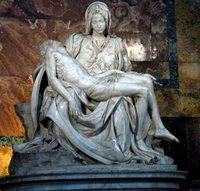Laughing, Crying, Living, Dying
Q: Have you ever heard, “Cry at a birth and rejoice at a funeral”? If so, is there a Scripture for this or is it an old saying?
A: This quote is not from the Bible. I’ve found similar thoughts coming from Irish folk wisdom and Buddhist philosophy.
 However, some Scriptures carry this understanding, which is one of Job’s major themes. After seven days of silent suffering, Job began speaking with a lament about his birth: “Let the day perish on which I was born, and the night that said, ‘A man is conceived....’ Why did I not die at birth, come out from the womb and expire...? Why is light given to him who is in misery, and life to the bitter in soul, who long for death, but it comes not, and dig for it more than for hidden treasures, who rejoice exceedingly and are glad when they find the grave? (Job 3:1, 11, 20-22)”
However, some Scriptures carry this understanding, which is one of Job’s major themes. After seven days of silent suffering, Job began speaking with a lament about his birth: “Let the day perish on which I was born, and the night that said, ‘A man is conceived....’ Why did I not die at birth, come out from the womb and expire...? Why is light given to him who is in misery, and life to the bitter in soul, who long for death, but it comes not, and dig for it more than for hidden treasures, who rejoice exceedingly and are glad when they find the grave? (Job 3:1, 11, 20-22)”Conception conveys the stain of Adam’s sin to all his heirs. In one way or another, each of us inherits God’s curses upon our first parents, since each of us inherits their rebellious natures. Left to our own devices, mankind can certainly live out Thomas Hobbes’ observation about “the life of man,” which, he noted, tended to be “solitary, poor, nasty, brutish, and short.” If death ends this mess, then why shouldn’t we celebrate?
However, life is still a gift from God and while sin shatters the “image of God (Genesis 1:27)” in which we were created, we remain His workmanship. While birth virtually guarantees death (Enoch and Elijah notwithstanding), each of us may celebrate with the Psalmist, “I am fearfully and wonderfully made. (139:14)”
Christians who understand sin and grace, who know that the believer is both saint and sinner, find reasons to laugh and to cry at a birth. A hymn testifies to the “bane and blessing, pain and pleasure” which are part of life — and then reminds us that these, “by the cross are sanctified.” We celebrate God’s gift of life even as we anticipate the sorrows each newborn child will experience.
 As we watch family and friends depart this earth, the pain of parting moves us to honest tears. Yet Christians mourning the death of believing family and friends don’t “grieve as others do who have no hope. (1 Thessalonians 4:13)” Farewell tears flow during songs of celebration because we know that death and tomb are “the gate of the Lord” and trust that “the righteous shall enter through it. (Psalm 118:20)”
As we watch family and friends depart this earth, the pain of parting moves us to honest tears. Yet Christians mourning the death of believing family and friends don’t “grieve as others do who have no hope. (1 Thessalonians 4:13)” Farewell tears flow during songs of celebration because we know that death and tomb are “the gate of the Lord” and trust that “the righteous shall enter through it. (Psalm 118:20)”Ecclesiastes 3:4 tells us that there is “a time to weep, and a time to laugh; a time to mourn, and a time to dance.” We realize that often these times overlap. Laughter is tempered by sorrow while grief is cushioned by joy. We may join Job in ruing our own days of birth but we also confess with Him in absolute confidence, “I know that my Redeemer lives, and at the last he will stand upon the earth. And after my skin has been thus destroyed, yet in my flesh I shall see God, whom I shall see for myself, and my eyes shall behold, and not another. My heart faints within me! (19:25-27)”
The greatest paradox of celebrating a death comes as we remember our sinless Savior’s suffering on our behalf. With great intent the ancient Church named the day of His crucifixion “Good Friday.” In darkest woe our greatest joy was born!
Scripture quoted from The Holy Bible, English Standard Version™, © 2001 by Crossway Bibles.
Send email to Ask the Pastor.
Walter Snyder is the pastor of Holy Cross Lutheran Church, Emma, Missouri and coauthor of the book What Do Lutherans Believe.
Technorati Tags: birth | death | laugh | cry | burial | sorrow | celebration

0 Comments:
Post a Comment
<< Home